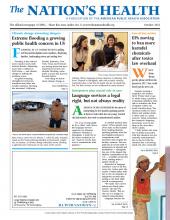
For more on managing the effects of childhood trauma, see www.samhsa.gov/child-trauma
Photo by PeopleImages, courtesy iStockphoto
Happy memories of a safe and loving childhood are something everyone should have. After all, our early years lay the foundation for the rest of our lives.
But while every child should have the chance to grow up healthy and happy, not all do. In fact, many children have difficult lives. They may not receive the care and attention they need and deserve, or experience traumatic situations.
The effects of these negative experiences can add up over time and last into adulthood. The more harmful things a child experiences, the greater the chance they can have health problems later in life.
“Our physical, mental and emotional health are shaped by what we experience when we are young,” says Mighty Fine, MPH, CHES, APHA interim associate executive director. “When things aren’t positive, it can make life a lot harder.”
Common traumatic things that can happen in childhood include divorce of parents, loss of a family member, moving often or living through a natural disaster. Children can also have a hard home life, experiencing physical and emotional abuse, neglect, homelessness or poverty. They may have a parent in jail or have trouble getting enough to eat. Add exposure to violence, racism or bullying to the mix, and it’s easy to see why some kids have a harder time.
About two-thirds of Americans have experienced at least one traumatic event during childhood. So if something difficult or harmful happened to you while you were young, you’re not alone. Unfortunately, people who experience harmful things when they’re kids can have trouble dealing with what happened, turning to drugs, alcohol or other risky behaviors to cope.
Childhood trauma can show up in our bodies too. People who have a lot of difficult experiences when they are young are more likely to have depression, earn less and have health conditions like heart disease, kidney disease and diabetes when they’re adults. In fact, studies show that at least five of the leading causes of death are associated with childhood trauma.
But the good news is that even if something harmful happens in childhood, it doesn’t guarantee that things will be bad for you later.
“Risk doesn’t define destiny,” Fine says.
Strengthening ties
Positive experiences in early life can help build resilience and protect children from the effects of the bad things that have happened.
Loving grandparents, kind neighbors, understanding teachers and trained adult mentors can help offset the impacts of trauma by building safe, healthy, stable and nurturing relationships and environments for children.
In addition, building healthy relationships with other kids, such as playing on a sports team or participating in after-school activities, can also help offset negative experiences.
Services are available that can help both children and adults heal from the difficult things they’ve experienced. It can also help them understand that they are not responsible for what happened to them.
“It’s important that adults heal from their past traumas so that they don’t create an environment that exposes their own children to negative events,” Fine says.
Counselors, therapists and other mental health professionals can help people recover from their experiences and connect them to substance abuse treatment or other services. Other pathways to healing include meditation, physical exercise, hobbies, volunteer work, yoga, journaling and spending time in nature.
If your child has been exposed to trauma, care is available for them too. Start by talking to your doctor or school counselor. They can get your child the help they need and teach them skills to cope and recover.
If you’re finding it hard to be a parent, look into parenting education classes, which may be available through your local family services office. Parenting is not easy, and it can be especially hard if you did not grow up with a good example. It’s always OK for caregivers to seek help about parenting.
Lending a hand in recovery
You don’t have to have a child yourself to help out kids in need. One of the best things you can do to help children thrive is to be there. Lend a hand in programs that support kids or teens, like scouting groups and after-school programs or in activities held by community centers and religious groups.
If you want to have an even bigger impact, sign up for a program like Big Brothers, Big Sisters, which matches children and teens with adult mentors. Some communities also have special programs for adults to mentor at-risk kids who have come into contact with the court system.
“A strong support system of friends, family or others can create connection and belonging and help people heal,” Fine says.
- Copyright The Nation’s Health, American Public Health Association









